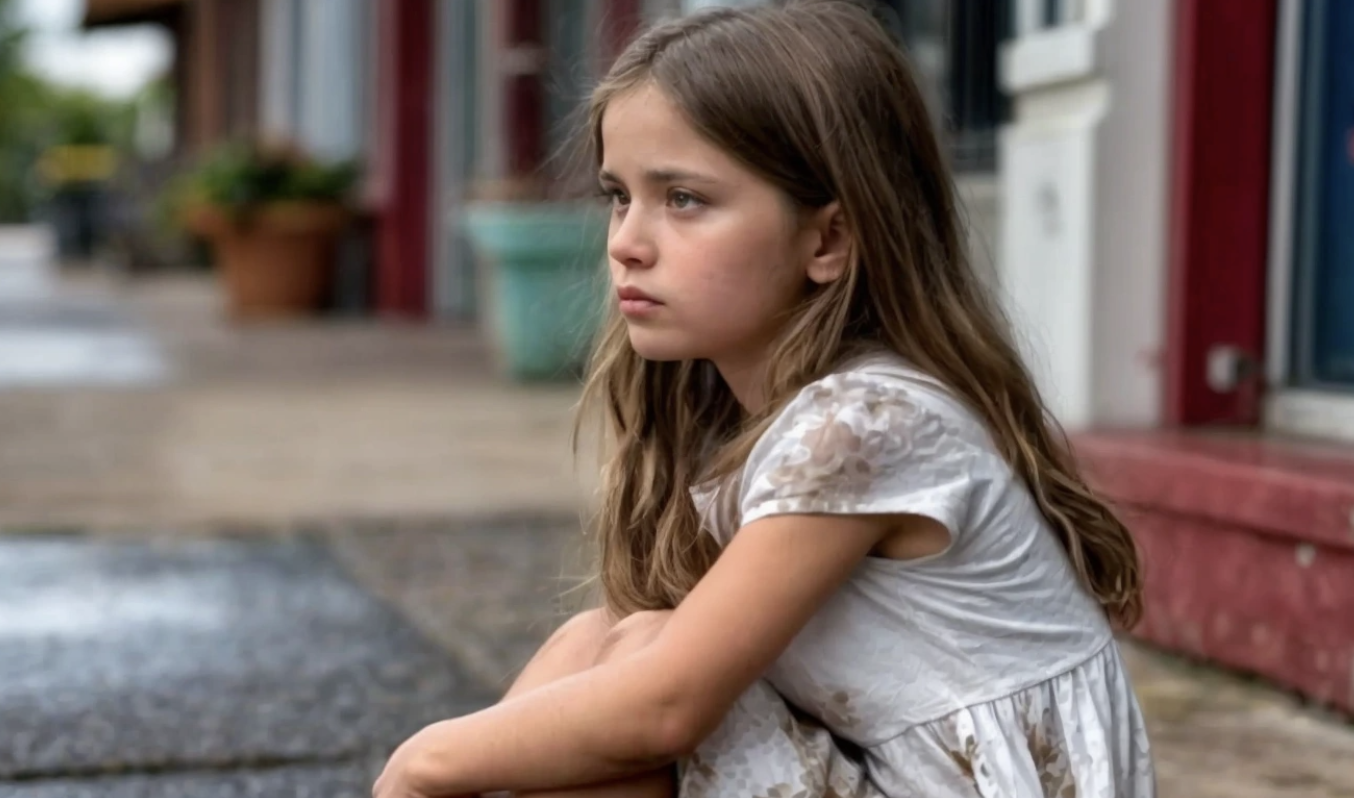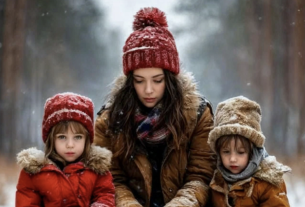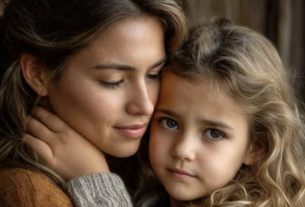The crisp autumn air was thick and prickly. Alina, wrapped in a light coat, walked out of the office center she had considered her second home just an hour earlier. Now it was just a glass monster that had spat her out onto the roadside of life. In her ears still rang Arkady Petrovich’s nasty, rasping voice, and before her eyes—his smirk, crooked and smug, like a scar on a clown’s face.
“Layoffs!” it screeched in her memory. “Either resign of your own accord, or we’ll fire you for cause! If we have to, we’ll find a reason!”
She got into the car—her old, life-worn Lada, the only thing her ex-husband hadn’t managed to take after saddling her with his debts. Her hands settled on the wheel by themselves, cold and rough to the touch. First breath. First exhale. And then the tears came. Quiet, bitter, unstoppable. They ran down her cheeks, salty and burning, mixing with lipstick and foundation. A drop fell onto her hands, clenched in a helpless fist.
“How am I supposed to live now?” she whispered into the silence of the car. “And with what, most of all?”
The traffic jam ahead grew like a living organism, swallowing any hope of getting home soon. Home? To her mother’s empty apartment, to a silence where the only sound would be the hum of the refrigerator and the nagging chime of thoughts about debts, injustice, betrayal.
She pulled onto the shoulder by a familiar 24-hour shop. “I’ll buy something with the last of my honestly earned money,” she decided with bitter irony. “I’ll wash down my bitter pie with bitter wine.”
Walking around the car, she heard a shrill, piercing voice.
“Get out of here, beggar! How many times do I have to chase you off! Go on, beat it!”
At the store entrance stood a stout woman in a blue apron, waving her arms like a windmill. Her target was a small, scrawny figure frozen by the wall. A girl. Five years old, at most. In an old, battered raincoat and rubber boots that didn’t fit.
“And what exactly are you yelling for?” Alina’s voice came out hoarse from recent tears, but firm.
“She’s standing here, that’s what!” The saleswoman jabbed a finger toward the child as if pointing at a bothersome cockroach. “Begging for alms! I’ve chased her off already, but she keeps coming back! There are too many of you beggars around here!”
“Stop shouting,” Alina said more calmly now, but with steel in her voice, “or do you yell at children like that at home too?”
“My home is just fine! My kids are fed and cared for! This little tyke needs to be taken to a special holding center! I’ll call the police right now!”
Then the girl, curling up into a ball, whispered so softly it sounded like the rustle of a fallen leaf:
“Don’t call the police. Please give me a little for bread.”
Those words. That plea. They pierced Alina through, reaching a depth even Arkady Petrovich’s roar hadn’t reached. The tears welled again, now searing—from someone else’s pain.
“Sweetheart, where are your parents?” Alina crouched down to the girl’s level, trying to meet her eyes.
Large, gray, far-too-serious eyes looked at her without hope.
“I don’t have any. There’s only Aunt Sveta—she took me from the orphanage.”
The saleswoman fell silent for a moment when she heard that. Her own maternal heart, tucked beneath layers of fat and irritation, stirred.
“Listen,” she said to Alina without malice now, “maybe she really should go to the holding center? Who knows what kind of ‘aunt’ that is…”
The girl stayed silent, and Alina ignored the remark. Something inside her flipped, clicked. The pain of being fired, the resentment, the fear—all of it receded, trampled by a single thought: “She’s asking for bread. Right now. And here I am bawling about my loans.”
“Sweetheart, how about coming to my place?” Alina said, surprising even herself with her resolve. “It’s cold out here. I’ll feed you, and then we’ll sort things out—with your aunt and everything else. Will you come?”
“Will you give me food?” the girl asked, and a tiny, timid spark flickered in her eyes.
Smitten by the scene, the saleswoman tilted her head back to hold back sudden tears, sniffed, and retreated into the store.
“Of course,” Alina nodded. “There’s my car—we’ll go to my place now.”
“I’m Liza,” the girl said when Alina settled her on the back seat, which was covered with an old plaid blanket. “What’s your name?”
“I’m Alina.”
The conversation went no further. Warmed by the car’s interior, Liza almost instantly dozed off, worn out by cold, hunger, and fear.
Once home, the first thing Alina did was hand Liza a sandwich with sausage. The girl ate greedily, like a little animal, without unclenching her fingers, as if afraid someone would take the food away. While she ate, Alina studied her: the grime, the tangled hair, the thin, gaunt face.
“Let’s get you washed up, and then I’ll give you a proper meal, all right?” Alina suggested.
Liza nodded, licking sausage-scented fingers.
“Oh God!” escaped Alina in a strangled breath when she helped the girl take off her clothes.
The child’s body was covered in terrible, old burn scars. The traces ran along her back, arms, legs. A mute, brutal story of pain.
“What nightmare did your life start with?” flashed through Alina’s mind, and rage bubbled up inside her like a hot, murky spring.
In the bath Liza was quiet and compliant, doing everything she was told with an unnatural, chilling resignation. Once she was clean, bundled in Alina’s soft flannel robe, and fed her fill of hot soup, Alina asked:
“So who is Aunt Sveta?”
“Aunt Sveta is a kind lady who took me from the orphanage,” Liza answered in a monotone, like a memorized lesson. “She tells me to walk the streets and ask for money. Then she feeds me and lets me sleep in a room on a bed. And if there’s not much money, then I sleep in the hallway with the other kids.”
“And are there many children with Aunt Sveta?”
“From the orphanage like me—five. And she has her own kids too—two of them. Fat Stepa and Vitya. But Vitya is mean. He always hits and yells.”
“You’ll spend the night here with me, and tomorrow…”
“Auntie Alina, can you take me back to the orphanage?” Liza cut in. “It was better for me there.”
Alina swallowed the lump in her throat. Her nose stung again.
“Let me not take you anywhere tomorrow. Stay with me for now, and we’ll see. By the way, how old are you?”
“I’m already six, almost seven, but Aunt Sveta said they don’t take stupid ones like me to school.”
“Six? Almost seven?” Alina couldn’t hide her surprise. The girl looked a year or two younger. “It’s late—let’s get you to bed.”
“Here?” Liza asked, pointing at the sofa. “Or in the hallway?”
“Of course here,” Alina blurted. “No hallways!”
“Auntie Alina, can you sit with me until I fall asleep?”
“All right,” Alina smiled, her heart tightening with tenderness and fury at once.
While Liza drifted off, Alina stroked her hair thoughtfully, running her fingers through the thin, lifeless strands. Her hands were gentle, but inside, anger boiled.
“Aunt S-sveta! You monster! Children!”
She already knew what she would do tomorrow. Police, child services, a lawyer, court! “I swear I’ll see that witch in prison!”
Liza was softly snoring on the sofa when Alina was already scouring the internet, hunting for phone numbers and articles of the Criminal Code. She was so absorbed she didn’t notice the girl wake up.
“Auntie Alina, tie me a ponytail, please—my hair keeps getting in my eyes!”
“Right away, sweetheart,” Alina answered with a smile.
She picked up a comb, chose a pink hair tie, and got to work. The hair was sparse, and so Alina noticed three tiny moles just behind the right ear, almost perfectly arranged in a line. She was careful not to touch them.
“Moles,” Alina thought. “Three moles behind the ear. Something familiar.”
Her memory played hide-and-seek for a long time, then produced a recollection that sent goosebumps racing down her back. Six years ago. A headline case. A fire in the country house of one of the founders of a major holding—exactly the one where she worked. The owner’s entire family died, except for him. Andrey Viktorovich had been away. And… his six-month-old niece, whose body was never found. He was sure the girl had been kidnapped. He offered a wild reward. Her distinguishing marks—three moles behind the ear forming an isosceles triangle. Back then the whole city went mad checking every baby’s ears. Alina, then a junior employee, had absently circled those moles on the newspaper photos with a pen.
Andrey Viktorovich searched for two years, then gave up, stepped away from business, and shut himself in his estate.
“Is it her? It can’t be… It’s too incredible…”
Her heart hammered. Alina was used to thinking out loud, but now she was afraid to spook the possibility itself. She put on a cartoon for Liza and locked herself in the kitchen.
“Against! Don’t lose your mind looking for patterns where there are none!” she whispered to herself. “A coincidence. A cruel, absurd coincidence.”
“For!” argued her inner voice. “Someone could have saved her from the fire. She ended up in the hospital with burns, went unidentified, then an orphanage… Aunt Sveta might have had no idea.”
Fantasy? Yes. But what if? What if this was that one-in-a-million chance? A chance to return a child and… maybe for herself to get a chance to climb out of the debt pit? The thought was mercenary, and Alina chased it away at once, but the aftertaste remained.
Quietly, she snipped a lock of sleeping Liza’s hair and wrapped it carefully in paper. Tomorrow. She would check everything tomorrow.
Finding Andrey Viktorovich’s contacts wasn’t easy, but it wasn’t impossible. Through acquaintances and their acquaintances, Alina reached his security service. She had to explain herself to the head of security, a stern man named Konstantin.
“You understand, I’m not sure it’s her. It’s just, well, the pieces line up,” she said, hearing how her story sounded.
“Miss, you need to watch less TV,” he replied coolly. “You do realize you’re talking nonsense?”
“Nonsense three times over if you like!” Alina flared up, losing what caution she had left out of sheer despair. “Even if there’s a one-in-a-million chance, you’re obligated to check it! Obligated!”
With a sigh, he finally relented.
“Leave the sample and your contact information. We’ll be in touch.”
Alina spent three days on pins and needles. She put off calling the police, clinging to hope for a miracle. And the miracle came. Her doorbell rang.
On the threshold stood a not-old but completely gray-haired man with eyes brimming with tears and hope. Behind him—Konstantin.
“Liza!” The man dropped to his knees before the girl, his voice trembling. “Is it you? Is it really you?”
He embraced her, pressed her to him, then scooped her up and, without another word, carried her toward the elevator. Konstantin lingered.
“Alina Sergeyevna, while the test was being processed, we compiled a dossier on you. And when the positive result came in…” The stone mask fell from his face, and something like respect flickered in his eyes. “I don’t know what kind of providence guided you, but we owe you. All your debts are cleared. Arkady Petrovich’s actions have been deemed unfounded. Your entire department is being reinstated.”
“He’s just a bastard!” burst out of Alina.
“Which is why he’ll be fired. And we’d like to offer his position to you.”
Alina’s heart skipped. The dream of her entire career. But with the joy came another thought.
“May I?” she asked.
“What exactly?” Konstantin didn’t understand.
“May I be the one to fire him? Deliver the news and walk him out?”
For the first time, the man allowed himself the faintest smile.
“Only if you do it with particular cynicism.”
“Don’t worry—I’ll do my best.”
Two weeks later, Alina’s life had changed completely. A new office. New authority. Colleagues’ respect. But most of all—a call from Konstantin and an invitation to Andrey Viktorovich’s estate.
A vast house nestled in greenery. And across the lawn ran a very different Liza, laughing, arms outstretched. Clean, well-groomed, in a pretty dress, cheeks rosy.
“Alina! Alina! Alina!”
“Lizonka!” Alina dropped to her knees and hugged her. “How you’ve blossomed!”
“I have so much food now!” the girl squealed, then added in a whisper, “And dolls! And a dollhouse! Will you come play with me?”
“If Uncle Andrey allows it, I surely will.”
“Good afternoon, Alina Sergeyevna,” Konstantin greeted as he approached. “Andrey Viktorovich is in a meeting, but he asked me to convey his immense gratitude. Liza can’t stop talking about you now.”
“I’ve missed her too,” Alina admitted.
“According to our information, you weren’t exactly idle,” he said with a barely visible smirk. “Where can we talk? In the garden?”
They stepped out onto the terrace. The air was saturated with the scent of pine and the last autumn flowers.
“Does your back hurt?” Konstantin asked unexpectedly.
Alina flinched and blushed.
“If you think we’re unaware of your… ‘extracurricular activities,’ you’re mistaken.”
“It’s been two weeks!” Alina flared. “And you still haven’t done anything! There are children there!”
“Alina Sergeyevna,” his voice grew serious. “We can storm the place with the police tomorrow. But ‘Aunt Sveta’ is just a small link. She’s under someone’s protection. If we squeeze her now, the rest will scatter. We need indisputable evidence, and the whole network. Liza hasn’t recovered yet. Start interrogations now, and she might shut down forever.”
“But we can’t just leave things as they are!” Alina cried in despair.
“No one is leaving them. For Andrey Viktorovich this is a personal priority. Work is underway—quietly and methodically. How do you think I know about your back?”
Alina blushed again. She had found out where Aunt Sveta lived from Liza back then—and had gone scouting. Climbing a tree across from those very windows, she tried to photograph evidence. It ended with a fall from a branch and a broken phone. It turned out the team had been watching her.
“We have our own observation post in the building across the way,” Konstantin explained. “We need the whole of her conversation. A confession. So she’ll give up everyone she works for. No police. Yet. After that—straight to the prosecutor.”
Relief washed over Alina.
“I thought you’d decided to forget it. But if that’s the case…” She took a deep breath. “You’re still dragging your feet, though!”
“Aunt Sveta is a special specimen. She can tell you to get lost in a second. We need to push her into making a mistake—provoke emotions. Any ideas?”
Alina had ideas. First, she took it out on that saleswoman—every day releasing radio-controlled toy mice into the store and savoring her shrieks. Petty? Yes. But satisfying.
And then The Plan was born.
The hardest part was arranging things with Aunt Sveta’s other children. They were intercepted on the way to “work,” fed, persuaded. Liza helped. She assured them it was a game after which they would all live together in a big, beautiful house. When he heard the plan, Andrey Viktorovich provided unlimited resources to carry it out. A makeup artist, a special-effects expert, actors were hired. Every detail was rehearsed.
Night. Aunt Sveta’s apartment. She woke to a strange bluish light pouring in from the balcony. The door creaked open. Liza stood on the threshold. In a long white robe, her face glowing with an eerie phosphorescence.
“Aunt Sveta…” came a mechanical, “enchanted” voice. “Spare some bread…”
Tiny blue lightning bolts arced from her hands. Aunt Sveta recoiled in terror.
“For bread…” the voice moaned, and Liza’s figure began to rise slowly above the floor, as if hovering in the air.
A scream of horror tore from the woman’s chest. She rolled into the corridor and rushed into the bedroom to her sons. That room, too, was bathed in blue light. On the floor lay her Stepan and Vitya, and around them, smacking and chewing, sat her “wards.” Their faces were smeared with something red, and their eyes glowed with the same unearthly light.
“So tasty…” they murmured, turning their ghastly faces toward her. “So tasty, Aunt Sveta…”
She saw that her sons’ bodies seemed mutilated. Her mind snapped. She collapsed to the floor, wailing in helpless, animal terror.
They took her as she staggered out of the apartment in panic, trying to flee. The interrogation was brief. She broke at once, giving up everyone—suppliers, protectors in the agencies, the schemes. She signed every statement. Only then did they show her her sons—alive, well, merely put to sleep with a mild gas. And the “bloody” streaks on their bodies and the children’s faces turned out to be a makeup artist’s handiwork and ketchup.
“Thank you, Alina Sergeyevna,” said Andrey Viktorovich, shaking her hand. “An entire network has collapsed thanks to you. Dozens of children will be saved. And Liza has found friends.”
“Thank you,” Alina said, embarrassed. “I couldn’t have done anything on my own.”
“Anyone can execute; dreaming up something like this is another matter…” He smiled. “Honestly, I wouldn’t want to quarrel with you. Frightening. Even Konstantin might not be protection enough.”
Alina blushed, feeling the gaze of that very head of security standing a little apart.
“No need to blush—he reported everything himself. My blessings—may you two have love. He’s not bad, you know. And single.”
Konstantin came closer, and in his usually severe eyes Alina saw a warm, living expression.
“Well then, genius of revenge and producer of the most incredible spectacles in our city,” he said, “shall we discuss your future employment? And not only that…”
He held out his hand. Alina took it, and realized the goosebumps racing across her skin now were from happiness. From the fact that life—cruel and unfair—had suddenly made a sharp turn and carried her straight to those who had become truly dear to her. To hope. To home. To love.



